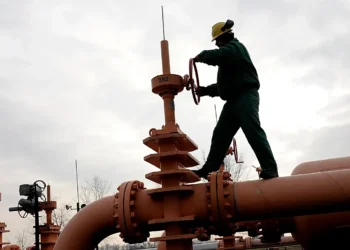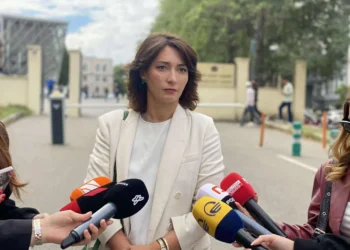The United National Movement, as the third political party to govern Georgia after the fall of the Soviet Union, has been one of the most controversial parties. Its charismatic leader, Mikheil Saakashvili, founded the party and soon after became the President of Georgia, moving the country as close to Europe and NATO as never before. On this path, he and his government made several critical mistakes that, in the fall of 2012, saw them losing power and becoming the “opposition,” which they have been for almost a decade. Their leader is now in prison, and GEORGIA TODAY choose to grab the interview with UNM member Petre Tsiskarishvili on Saakashvili’s latest predicament.
Let’s start with the slogan #FreeSaakashvili, #FreeMisha. Don’t you think that releasing the person who pardoned the killers of innocent Sandro Girgvliani will give the “Georgia Dream” leaders enough reason to never allow justice?
Everybody in this country, including our international partners, has come to an agreement that the judges are controlled one way or the other by the “Georgian Dream” party. Therefore, the decisions that are delivered by this judicial system can’t be fair. In Mikheil Saakashvili, they see political defeat in free and fair elections to the GD party, so they have only two solutions for him – To be outside of the country or isolated in prison.
How about illegally crossing the border of Georgia? Don’t you think that this was illegal and he should be jailed for that?
Yes, it’s not right. It’s illegal. But the sentence that is delivered upon such an illegal act is usually a few weeks of detention in the immigration center or a fine, not imprisonment for many years, which is a political thing in Saakashvili’s case.
If, under your governance, Bidzina Ivanishvili (founder of the ruling “Georgian Dream” party) had “illegally crossed the Georgian border,” what could he have expected from the Georgian justice system?
I don’t know. If he had crossed the border, we would probably have welcomed him, because he is a political player. He would probably have paid a small fine for illegally crossing the border and violating the immigration laws, and have continued to do politics as he did back in 2012 when he won the parliamentary elections.
Watch!
Don’t you think that when the EU must decide whether to grant us candidacy status, it’s counterproductive to inform our partners about all the mistakes GD ever made?
C’mon, are you joking with me now? How can something that is true be counterproductive in terms of communicating with our partners in Brussels, DC, or any other capital?
You have to be frank, you have to be truthful, and you have to speak about what you believe to your partners. Otherwise, what are you doing in politics, whether you are in opposition or in government? On the other hand, our international friends from Brussels or any other place, they have their embassies here, they have reliable sources, they communicate with civil society, so they have full information, they know all the details that are going on in Georgia’s political life.
But we haven’t seen that discussion in the European Parliament before. Why did European Parliament members decide to talk about how Georgian media was under attack only this time when we are very close to getting membership candidacy status?
That’s a really good question! I think, there are a few reasons. First of all, the detention of the Director and founder of the “Mtavari” channel – Nika Gvaramia, happened for some very odd reason right before such decisions were to be made. Secondly, it’s that the Georgian government to date has not picked a side, and has not made a specific position on whose side they are on. Verbally, they support Ukraine, by their deeds they support Russia. The ambivalence of the Georgian government has also fueled, obviously, many questions, and the position that has been delivered by the European Parliament.
Listen!
What will UNM do if Georgia is not granted EU candidacy status?
At the time of this interview, we already know the preliminary position of the European Commission on the status. They have told us to first meet the conditions and deliver on the reforms that are requested from the European Union towards the Georgian Government, and only then can we start discussing the candidacy status. Even the timeline and timetable have been determined and, by the end of this year, we have to address the issues that are on the table. So, we will push the government, we will urge the government, we will cooperate with our international partners, civil society, and everybody in the country with our constituencies and supporters to make sure that by the end of this year, the terms and the conditions that have been laid out are actually implemented and are addressed. If they don’t do this, then parliamentary elections will come very soon and we will do our best to defeat them in those elections.
The previous question comes from the statements of members of the ruling party, who said that “If we do not get the candidacy status, the UNM will do everything anti-governmental to remove us from the government”.
Parties are created to run in the elections and to try and prevail in those elections. This is the concept that the GD has a problem understanding. This principle is a fundamental political problem for the ruling party. Also, on the other hand, it fuels the polarization, because when you have a party that never wants to give up power, obviously, that’s not a very healthy political environment.
PM Garibashvili reminded us that NATO rejected our request to get MAP. It didn’t stop your party, your government, and Saakashvili, from developing the country and moving it forward to NATO. Why should we be so critical about GD if the EU rejects our request for candidacy status?
It’s not a very adequate parallel that the Prime Minister has drawn here because for the UNM party and for Mikheil Saakashvili’s administration, this aspiration for the Euro-Atlantic integration was genuine. It was the business of political will and natural aspiration towards the West. In GD’s case, would we be able to say the same? Would we be able to say that “Yes, they are willing to administer the reforms that are laid out by the European Commission, even today, for example? Are they genuinely ready to let Media do its business on its own without politically prosecuting every single manager and founder of those companies, let alone imprisoning Nika Gvaramia? I don’t think so! In their case, it’s going to be much more difficult to continue on the same path towards integration into the West and, in this case, our aspirations to receive the candidacy status to the European Union. Because they are afraid of being removed from the government and they are afraid of losing the majority in the parliament. In almost every case… Are they ready to administer reforms that address the deoligarchization of Georgia, and remove themselves from Bidzina Ivanishvili’s political, financial, or whatever type of influence he has, over his cronies and so-called team? Of course, not! So, these are the differences.
We remember the UNM calling Gakharia to resign after the raid on June 20. Then we saw you protesting his appointment as Prime Minister. How fair is that from you, the party who had no questions with Ivane Merabishvili, who as the internal affairs Minister at that time, the author of the November 7 raid, and who was appointed Prime Minister under your government?
Both November 7 and June 20 were dark spots in Georgia’s recent history. I’m not saying that politics is always fair and always ideal, people make mistakes and those mistakes need to be addressed if there are criminal acts, but again, the public, civil society, and society in general, first of all, need to have confidence in the judicial system. We made our fair share of mistakes during Saakashvili’s administration and while we were in the government. We made mistakes in terms of political judgment and in terms of appointments, perhaps, as well. But the final verdict of the voters in the 2012 elections was that we had to pay the political price for this. But, as we discussed before, GD doesn’t understand this idea and doesn’t want to accept the fact that at some point, their government can be replaced by another which has a majority in parliament. So this is the major difference between the two parties and the two ideologies of UNM and GD.














